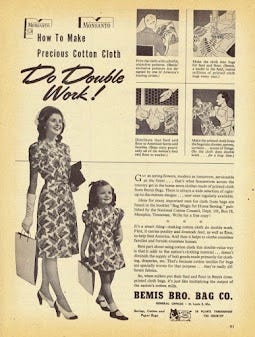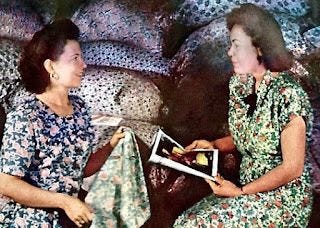Feedbag Fashion
Sep 19, 2024
Who would have guessed a flour mill employee could change the history of women’s fashion?
It was 1924 and Asa T. Bales, an employee for the George P. Plant Milling Company in St Louis, Missouri was accustomed to seeing normal folk live with a “Can Do” attitude. But a growing trend flipped everything on its head.
Here’s what happened.
In the 1920’s women could either buy clothing from expensive high street shops, or make custom dresses at home with purchased fabric. But with rising prices, the thrifty and creative women of the Midwest had recently turned to another… cheaper… source of material:
Animal feedbags.
You read that correctly: women were repurposing sacks… initially designed for farm animal feed… into dresses.

Gone were the days where feedbags were made of coarse burlap material. This was the 20th century! Cotton linen was sturdier, easier to produce, and better yet, the enterprising women of the Midwest realized the material withstood the daily rigors of farm life for pennies on the dollar.
All except for one problem: feedbags had company branding on them. And no one wanted “ACME FEED Co.” blazoned across a blouse. How could they fix that?
Enter Asa T. Bales. “What if we made bags with attractive patterns and designs BUT used a dissolvable ink for the company brand?” He thought. That way, women could still use the materials for whatever home project they wanted, and simply wash out the logo.
And so, on October 29, 1924, Asa T. Bales filed patent application №746,673 for the use of dissolvable ink on feedbags, and the rest was history. His company sold more bags, increased their profits, and others followed suit. Feed sack fashion took off, and over the course of the Great Depression and World War II, over 30 other companies produced feed sacks designed to be clothing. In fact, a 1942 survey estimated 3 million women and children were wearing feedbag clothing across the nation.
As more and more people shopped for the bag designs, instead of the animal feed itself, one store owner complained, “Years ago they used to ask for all sorts of feeds, special brands… now they come over and ask me if I have an egg mash in a flowered percale. It ain’t natural.”
All the while, Asa T. Bales’ idea of dissolvable ink- and removing the company brand- was helping make this happen.

What does this have to do with influence and success?
There are several takeaways, but one lesson is, Asa T. Bales’ idea served people’s needs on multiple levels. On one hand, they needed to feed their animals. But at the same time, they ALSO wanted clothing that was affordable and made them feel stylish. His idea served both.
He helped meet their surface level need and their deeper need at the same time, and doubled the value he offered.
And if the value you offer is twice that of others? People choose you again and again.
I don’t know about you but when I was little, going to the grocery store with my Mom was one of the worst things.
It was so boring.
The cart was uncomfortable to sit in.
Are we done yet Mom?
And I’m sure my Mom muttered the same question. Are we done yet?
My Mom had the surface level need of getting food for the family. But she had a deeper level need of dealing with 4 kids who didn’t want to be there.
I recently delivered a speech to a grocery store chain who realized most Mom’s deal with this problem and came up with an ingenious (yet simple) way of doing this. What if you gave the kids mini shopping carts to push?
As I walked through the grocery store to learn more about their business and customize my speech, I saw a Mom with several kids in tow. Instead of a stressed out Mom quietly threatening the children to behave, I saw a family that was happy, cheerful, and not on the verge of tears. The secret? Each kid had their own mini cart filled with needed items. They had something to do that mattered.

True, they were squirrely and distracted, but they weren’t fighting or complaining. I approached and asked the Mom how this made a difference to her shopping experience and she said, “It’s a life saver. We actually drive out of our way to this store JUST so my kids can use the mini carts. It makes it so much easier.”
Did you catch that?
From her perspective, there are other stores nearby that could solve her surface need (to buy food). But she drives OUT OF HER WAY to this particular store because they make it easier to handle a deeper need (make shopping with children easier).
This store doubled the value they offered her, and she goes out of her way to choose them again and again.
When we serve people, we often focus JUST on their surface level needs. And while that’s important, if you can look for their deeper needs, you will come out on top.
Think of someone you serve. What is their surface level need?
Now ask yourself, what is a deeper level need they may have at the same time?
How can you serve both?
Attention follows value and connection, and when you double the value, people will go out of their way to pay attention… and ultimately choose you.
Just ask Asa T. Bales and the 3 million people who wore his dissolvable big idea.
- Christian
CHRISTIAN HANSEN has gone behind the scenes in some of the biggest organizations in the world to find out the reasons why some people get chosen and why others don’t. As the #1 bestselling and LinkedIn Top Ten ranked author of “The Influence Mindset: The Art & Science of Getting People to Choose You” Christian helps teams and organizations who want to stand out and be the obvious choice. With degrees from Brigham Young University and The London School of Economics, he’s helped thousands of individuals position and sell themselves. A fan of international communication, history, and choral music, he currently lives in Utah with his wife. Reach him at: TheChristianHansen.com
Its Like Getting a 1-1 Coaching Session
Delivered to Your Inbox.
Join our mailing list to receive weekly Influence Insights that will make you the obvious choice to Decision Makers.
Don't worry, your information will not be shared.
We hate SPAM. We will never sell your information, for any reason.


